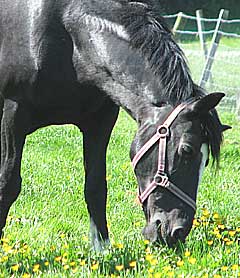
When to feed probiotics for Horses and Ponies
 Probiotics
are added to a horse or pony's feed to encourage normal digestive
function and an efficient digestive system.
Probiotics
are added to a horse or pony's feed to encourage normal digestive
function and an efficient digestive system.
Probiotics for horses that are available include live bacterial cultures
and live yeast cultures.
Equine probiotics will typically include the Bifidobacterium and
Lactobacillus species of bacteria and the yeast Saccharomyces boulardii.
Yeast probiotics indirectly stimulate the beneficial fibre in a horse's feed - degrading micro-organisms, including bacteria, in the horse's hindgut.
Yeast cells do not colonise the horse's gut, therefore probiotics must be fed continuously for an on-going effect, and it may take a week before the probiotics take effect.
WHY FEED PROBIOTICS TO A HORSE OR PONY?
Feeding equine probiotics can be beneficial if your horse is convalescing after illness, or if its digestive system is exposed to the stress of competing at shows or there are changes to his normal routine.
Stress can alter the level of acidity in both the upper gut (small intestine) and hind gut (caecum and colon) of a horse of pony which then allows bad or non-beneficial bacteria to multiply and overwhelm the good bacteria in the horse's gut.
If left unchecked in the horse?s small intestine, bad bacteria, such as Salmonella and E. Coli, can cause health problems.
The aim when feeding a probiotic supplement to a horse is to enhance the hindgut's microbial population and, as a result of feeding probiotics, reduce the growth of potentially harmful bacteria.
Equine probiotics are useful as a feed additive in any circumstances that may affect the normal micro-organisms within the horses gut. These include:
- Changes in the horse's diet, including variable grass intake and the
addition of grain and other hard feed, affects the gut micro-organisms.
These micro-organisms may require help from probiotics in some horses and ponies. - Feeding grain or other hard feed. This alters the microbial populations
within the horse or pony's gut.
Stimulating the fibre - degrading bacteria in grain-fed horses and ponies will maximise fibre digestion. - During times of stress - including travelling - hormones that disturb gut function are produced, and this disturbance will affect the gut micro-organism populations.
- Antibiotic use detrimentally affects the beneficial gut micro-organisms, and may lead to diarrhoea. Priobiotics can help to prevent these unwanted side effects of anti-biotics.
- After a bout of colic, the horse's gut and its resident micro organisms may take some time to return to normal, and colic prone horses and ponies will benefit from ongoing assistance from probiotics for their gut micro-organisms.
- Diarrhoea, whatever the cause, disturbs micro organisms in the horse's gut.
- Poor chewing ability, common in old horses and ponies, means a less processed food source for
the fibre degrading micro organisms
FERMENTATION IN THE HORSE'S GUT
To understand the need to feed probiotics to a horse consider that a horse has evolved to primarily live on grass. The grass ferments in the horse's gut and so provides the him with nutrients.
Fermentation in the horse's gut is depends on the micro organisms that live in the large intestine. Probiotics keep these micro organisms flourishing and healthy, so that the horse or pony's digestive system functions at optimal levels.
PROBIOTICS FOR FOALS
A foal first receives micro organisms from its dam as it is being licked clean after being born.
Probiotics in a horse’s or pony's diet will encourage the micro organisms to flourish.
HORSE CARE ARTICLES AND EQUINE ADVICE
| Boiled Linseed for Horses | Why do horses eat mud? | Horse nosebleeds | Redworm |Sweet Itch | Kissing spines | Horse Colic | Cracked Heels | Eye problems | Soaking Hay | Arnica for bruised soles | Herbs for veteran horses | Feeding Haylage | Clivers | Rain Scald | Livery Wiltshire | Thrush | Calming Herbs | Equine Body Work | Horse feed retailers Dorset | Angleberry |